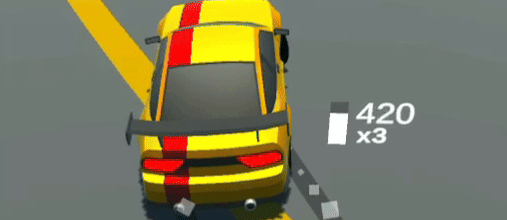Drifto Score System
Drifto scores your run as you drift. Better drifting gives a higher score which gives more coins and bragging rights.
Drifto is similar to a lot of drift games in this aspect. More points are earned by sliding faster and with a larger angle. Doing this well will also build a multiplier, allowing you to earn points even faster.
This is all shown next to the car as you drive.
Every frame a baseScoreIncrease is calculated. This takes into account the speed, angle, and surface the wheels are on.
private float GetBaseScoreIncreaseThisFrame()
{
if (!ShouldAwardScore()) return 0;
return
(
_carController.GetDriftAngle() * // angle
_carController.GetVelocity().magnitude * // speed
GetSurfaceTypeMultiplier() * // between 0 and 1 to take into account road type
baseScoreMultiplier * // just a constant to put scores in a nice range
Time.deltaTime // make this consistent across different framerates
);
}
This value is multiplied by the multiplier seen next to the car and added to your score for the run.
The ShouldAwardScore() function returns false if the car is on road that its already travelled before - this happens when the player goes backwards. So if this is the case, the base score increase is zero.
The multiplier is a number between 1 and 9 that is used to multiply the base score increase (why 9? because single digits make the UI easier).
When the multiplierProgress goes above 1, the multiplier increases as long as it's below the max. When it goes below minProgressForMultiplierDecrease (currently -0.25) it decreases.
Why not use 0 for the decrease threshold instead of minProgressForMultiplierDecrease?
Using a number below zero puts it in the players favour a little. It means you've got a little leeway before the multiplier drops.
private void UpdateMultiplier()
{
UpdateMultiplierProgress();
// increase multiplier?
if (multiplierProgress > 1 && multiplier < maxMultiplier)
{
multiplierProgress -= 1;
multiplier += 1;
}
// decrease multiplier?
if (multiplierProgress <= minProgressForMultiplierDecrease && multiplier > 1)
{
multiplierProgress += 1 - minProgressForMultiplierDecrease;
multiplier -= 1;
}
multiplier = Mathf.Clamp(multiplier, 1, maxMultiplier);
multiplierProgress = Mathf.Max(minProgressForMultiplierDecrease, multiplierProgress);
if (multiplier == maxMultiplier) multiplierProgress = Mathf.Min(multiplierProgress, 1);
}
This is where most of the multiplier complexity lives. As stated above, this number lives between minProgressForMultiplierDecrease (currently -0.25) and 1.
Every frame the progress is increased proportionally to the baseScoreIncrease.
float baseScoreIncrease = GetBaseScoreIncreaseThisFrame();
float multiplierProgressChange = baseScoreIncrease * multiplierProgressIncreaseSpeed;
If the car is on the ground, we also decrease it proportonally to the current multiplier level so that the higher the level, the harder it is to build up higher.
float multiplierDecreaseFactor = multiplier * multiplierEffectOnDecrease;
float multiplierDecrease = _multiplierDecreaseMultiplier * multiplierDecreaseFactor * Time.deltaTime;
multiplierProgressChange -= multiplierDecrease;
Lastly, we clamp the change (to stop it going up or down too fast) and apply it.
multiplierProgressChange = Mathf.Clamp(
multiplierProgressChange,
maxMultiplierDecreasePerSecond * Time.deltaTime,
maxMultiplierIncreasePerSecond * Time.deltaTime
);
multiplierProgress += multiplierProgressChange;
Real brief because this system needs some more work done to it and more bonuses added.
The current two bonuses (air time and reverse drift) work by building up their own score and applying it once the action is completed (landing on ground or exiting reverse drift).
The scores they give are not linear with time. I will explain this at a later date xo.
It runs every frame? So the score is framerate dependent?
The short answer is no, it's not framerate dependent.
By using the time between frames (Time.deltaTime) in some important calculations, we negate the framerate dependency.
The UFO Framerate test (https://www.testufo.com/) shows this but with distance instead of score. By multiplying the right value changes by the time between frames, we get the same result over time (even if one looks better).
